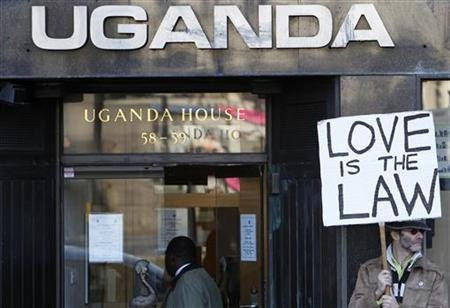Uganda Votes to Imprison Gays for Life

Uganda's parliament has passed the infamous anti-gay bill which proposes life imprisonment for homosexual offences.
The bill, originally introduced by David Bahati in 2009, awaits presidential approval to become law.
In its original form, the bill carried the death penalty for certain homosexual acts.
It was temporarily dropped during 2011, after an international outcry that followed the brutal murder of gay activist David Kato.
The speaker referred to the bill as a "Christmas gift".
Kikonyogo Kivumbi, executive director of civil rights organisation Uhspa-Uganda, told IBTimes UK that attacks and violence on the LGBT community are likely to increase now that the bill has passed.
He recounts how he was attacked and his vehicle ransacked by gay-haters in the days ahead of the bill's approval.
"We are planning to question the constitutionality of the bill before the constitutional court," Kivumbi said.
The law would force doctors, teachers, lawyers and other professionals to report someone who was homosexual within 24 hours - or face arrest.
The activist said the LGBT community should try to reach president Yoweri Museveni, but added the anti-gay legislation will likely be used for political manoeuvres ahead of the 2015 general elections.
"I don't see local appetite to pass the law, so the president will keep it on its side to blackmail the West," he said.
A similar allegation was brought by gay activists in 2012, when Parliamentary speaker Rebecca Kadaga, who has ties with the evangelical Christian organisation Family Life Network (FLN), drove the campaign to adopt the bill.
"They know that respect of human rights is a sensible subject in the West and they are using it to blackmail the international community," Kivumbi told IBTimes UK at the time.
Kato was the figurehead of Sexual Minorities Uganda (SMUG), an advocacy group that campaigned against the controversial Anti-Homosexuality Bill.
He was murdered after Ugandan weekly Rolling Stone pictured his face and that of another man on its cover under the headline "Hang them!"
The subhead read: "We shall recruit 100,000 innocent kids by 2012: Homos" and "Parents now face heart-breaks as homos raid schools."
The paper pledged to expose 100 gay people and printed the photographs, names and in some cases home areas, of people it claimed were gay.
Kato took the publishers to court and won but was murdered in his home a few months later, after declaring that he feared for his life.
© Copyright IBTimes 2025. All rights reserved.






















